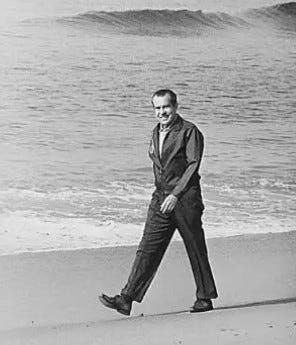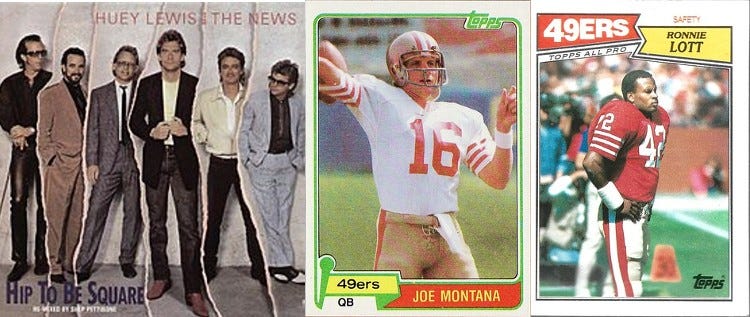Emmanuel Macron and his collection of snappy little suits have been reelected in France. Despite much nail-biting and gloom about the possibility of right-wing populist Marine Le Pen blowing up the European coalition, Macron has prevailed. That’s a big deal; Macron is the first French President to win re-election since 2002. He’s also the first to win while holding a majority in Parliament since Charles de Gaulle, that colossus of French politics who was a mix between Dwight Eisenhower (World War II hero) and Jackie Kennedy (extremely haberdashery-forward). And in the end, it wasn’t all that close: Macron won 59-41. In the US, when a candidate loses by that margin, we call it “getting Mondaled”.
Macron’s management skills were a prime selling point. In his first chance to speak in last week’s debate, he immediately brought up Covid and Ukraine, which might be the first time in history that a candidate has steered the conversation towards the crises that have happened on his watch. Concerns about Le Pen’s competence have dogged her for years, especially after a disastrous debate performance in 2017, which perhaps happened because an advisor recommended that she “eroticize” the debate. In my opinion, that’s very bad advice. Voters want to know that they’re in sound hands; they get nervous when a candidate responds to every question by slathering themselves in baby oil and emitting soft moans as they pinch their nipples.
People like me — nuance-mongering liberals — often complain that our brand of politics doesn’t lend itself to excitement. Populists promise bold and sweeping change; we promise modest improvements on what already works. Voting for a technocrat is as exhilarating as downloading a patch to Windows 11. Probably the only technocratic liberal to successfully claim the mantle of exciting change agent in my lifetime is Barack Obama, and my instincts tell me that you can only run the “first Black president” play so many times.
But there’s another side to that dull, dusty coin: People often see technocrats as competent. And that’s not nothing. In fact, it can be something big. I’m not optimistic about efforts to make technocratic candidates cool — very often, that veers into Christian-youth-minister-with-a-guitar-trying-to-convince-kids-that-Jesus-was-the-first-Taylor-Swift territory. But I don’t think that we need to be cool; being cool is for pop singstresses and rapping fellows. We need to emphasize what we're selling, which is (or should be) good, competent management.
Let me run through a brief history of attempts to make center-left candidates cool. To my knowledge, there is exactly one example of this working: Bill Clinton. And that effort looks incredibly ham-fisted in hindsight — watch this famous clip of Bill jamming on Arsenio, which is basically the year 1992 captured in a bottle:
I cannot fucking believe that voters went for that. I find it hilarious that Clinton’s campaign opted for the Joe Cool shades, a move that has real “elementary school principle doing an end-of-year skit” vibes to it. The topper has to be Arsenio ending the brief jam session with: “You can’t beat that!” Can’t you? Can’t you, Arsenio? I’m no jazz historian, but part of me doubts that a mid-40s Arkansas governor standing stiff-as-a-board while he warbles his way through a tune that you could probably find in a book called “40 Easy Saxophone Pieces for White Kids” is going to make the world forget Charlie Parker.
Also, I’m 90 percent sure that clip would get you cancelled today. I’m not quite sure which part would be the death knell, but it really feels like there’s something in there.
Yet somehow, that appearance — along with Clinton’s laid-back answer to a question about his underwear during an MTV town hall (nobody knew how many opportunities we’d have to talk about Bill Clinton’s junk) — helped establish Clinton as the hip, exciting candidate. It probably helped that Democrats were desperate to make the “Bill Clinton is the future” dog hunt, since they’d been Mondaled three times in a row (one of which was a literal Mondaling). So, that looks like a template: You find a candidate with some basic high school band chops, slap on some $8 shades from Rite Aid, put him on a talk show with a young audience (who’s Trevor Noah’s band leader these days?), and wait for the buzz to commence.
But I don’t think that model is replicable. The biggest difference is that the right — not just in America, but across the Western world — has changed a lot. Economic and social conservatism are on the wane; the populist and libertarian variants are rising. Clinton was running against George H.W. Bush, who — like many Republicans of his time — was seen as a prudish technocrat. It used to be Republicans who fielded sober, stick-in-the-mud candidates who would resort to desperate publicity stunts to try to spark some small glimmer of enthusiasm. Like this guy:

Post-Bill Clinton Democrats had a tougher time coming across as lively and exciting. John Kerry suffered through the wind-surfing and space-sperm incidents, and Hillary Clinton’s “I keep hot sauce in my bag” pander might have seen the advent of the word “cringe”. All of which is to say: There’s no obvious shortcut to being seen as fresh and fun. It’s not a matter of lining up the right photo op or talk show appearance; the sax-on-Arsenio gambit worked exactly once, 30 years ago. Candidates with technocratic leanings will rightly see their paper-pushing persona as a political liability, but they should accept that there’s no easy fix.
Which is a problem if you’re running against a populist. The populist narrative is exciting; it ignited the plot to Network and a million imitators. It also contains a lot of Return of the Jedi DNA — it’s the moment when the people righteously strike back against the powerful. Whether you believe in that narrative or not — and it has different levels of truth in different contexts — you can’t deny that it’s provocative. It appeals to people who want to be part of a movement, who want to be involved in something big. It promises excitement to the terminally bored, who — as I’ve argued before — might be the most underappreciated demographic in politics.
So, what to do? I think you have to lean into the competence angle the way Macron and Biden did. It’s probably true that some people voted for Trump in 2016 for the sheer fuckery of it — they were bored and wanted someone entertaining. But Biden surely won many votes from many people who were just tired; the Trump news cycle was mentally taxing, and a terrible fit for Covid. Neither Biden in 2020 nor Macron in 2022 seemed to spark any real excitement; voters seemed to choose them the way you might choose to go to Wendy’s, which is to say: in an unenthusiastic manner because it does the job and is fine. But that was okay; when your choice is between Wendy’s and a van with “BEST MEAL YOU’LL EVER EAT” spray-painted on the side — the latter of which is undeniably more exciting than Wendy’s — in many cases, people will opt for the sure thing.
It would make sense if the market for wonkish competence has grown. Being a nerd is cool now; my nephews are into computers and fantasy games, which — in a stark departure from my generation — earns them friends instead of beatings. Influencers try to include some nerd cred in their lifestyle portfolio — every hot girl on Instagram has at least one shot of her in Larry “Bud” Melman glasses — and most people in Hollywood who amass any artistic freedom capital subsequently burn that capital on some “important” message piece that they’re not smart enough to make (no links because I’m a coward!). As I said in the subheading: It’s hip to be square, which is a 36 year-old pop culture reference to a band that was never cool, which makes it an extremely lame reference, and by extension: cool.

Most politicians try to establish themselves as knowledgeable and competent, but few have tried to make hyper-nuanced policy wonkishness their entire brand. Unfortunately, one who has tried is Elizabeth Warren, who — in my opinion — has become a factory for bad ideas. But in 2019, Warren’s “I have a plan for that” slogan put policy competence front-and-center in her presidential run, and her background as an economist and head of the Consumer Financial Protection Bureau gave her a plausible claim to that persona. Early on, she made positive impressions on people like Jonathan Chait, Matt Yglesias, and — you’re not going to believe this — me. I liked parts of her housing plan (the YIMBY parts), and I share some of her views on corporate competitiveness. But with time, her more blunt-edge proposals took center stage, especially the wealth tax (which I think is bad policy that can be done better other ways), and her Medicare For All plan (the funding for which became a frequent source of dissemblance). She never became the consensus choice of policy wonks — Chait chronicled his discontent — and she didn’t catch on with voters, either. She ended up winning zero states and getting only four more delegates than Michael Bloomberg, a man whose campaign was unlike the Hindenburg only in that the Hindenburg actually flew for a bit before bursting into flames.
I think Warren’s candidacy was flawed enough to not disprove the idea that the uber-wonk brand can work. Unfortunately, Democrats’ other recent high-profile attempt at establishing hyper-nuanced issue-management as a brand — Andrew Cuomo — was…well, I’d call it “not fully successful”. Though it’s worth nothing that the Crisis Management Professional angle worked really well for him until people found out about the…well, you know…lying about dead people and ass-groping. But could the uber-wonk angle work if the candidate doesn’t: 1) Embarrass themselves with bad policy ideas; 2) Lie about dead people; or 3) Touch many asses without permission? Both the good news and the bad news is that we don’t know.
Emmanuel Macron is now a major figure in French political history. I try to avoid jumping to conclusions after elections, which are infrequent and idiosyncratic, but we can surely learn something from the fact that Macron’s technocratic centrism has beaten Le Pen’s Sturm und Drang populism twice. I continue to think that “nationalist populism is on the march” narratives are a bit overblown, but I dislike that brand of politics and want it to fail. I’m in the market for strategies that can beat it at the ballot box. And it looks like emphasizing your management chops — and skipping the part where you pathetically try to convince voters that you’re fun and exciting — is a method that can work.





French here, there are two things I'd like to add. First, we can keep tempting Fate and smugly wonder how the American could possibly have elected Trump for an other five years. Hurray! Second, and more to the point of your column: when Le Pen was nearing Macron 51-49, most of the Mélenchon left-wing voters were saying they would never vote for Macron, to the point one poll showed more of them planning to vote for Le Pen than for Macron. But once the first round was over, they slowly came to their senses and realised the one thing they very much didn't want was a Le Pen presidency, so we ended up at 59-41.
Many of my social media contacts called Macron an authoritarian for his Covid measures, but still voted for him when they saw a politician with actual authoritarian sympathies. They would step barefoot on broken glass before they say anything nice about our government, but there is clearly *something* - be it competence, seriousness or sanity - that made them feel that although Macron was a Terrible President (they say), he was a Terrible President within the bounds expected from a French politician. Le Pen was seen as something else.
wow. LOVED your piece. As an American expat living in Paris who JUST left America and was awash in GLOOM over the weekend, you nailed the entire experience and observation of this French presidency campaign. Nailed it. Love it!